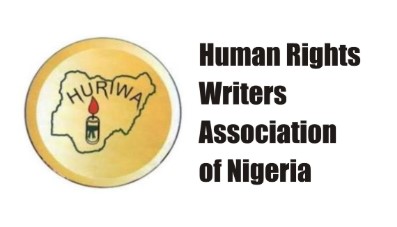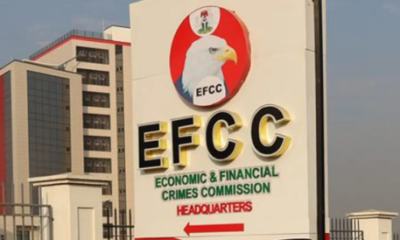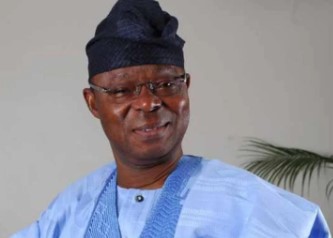Latest
Buhari hasn’t sacked me, Ofili-Ajumogobia tells court
Published
7 years agoon
By
Editor 1
JUSTICE Rita Ofili-Ajumogobia, who was dismissed by the National Judicial Council (NJC), yesterday told the Federal High Court in Lagos that she is still a judge of the court.
According to her, she remains a judge until President Muhammadu Buhari’s approval of her dismissal is gazetted.
She is praying the court to decline jurisdiction to try her for money laundering because a serving judge cannot undergo trial until formally dismissed.
Arguing her preliminary objection, Ofili-Ajumogobia’s lawyer Robert Clarke (SAN) faulted a letter from the Presidency confirming that she had been dismissed.
The Economic and Financial Crimes Commission (EFCC), which arraigned Ofili-Ajumogobia, tendered the letter as proof that she is no longer a judge.
But Clarke contended that the letter was addressed to the Chief Justice of Nigeria (CJN) rather than to the Chairman of the Federal Judicial Service Commission (FJSC).
Besides, he said the letter was marked “Restricted”, thus making it a private document.
“Having been marked by the maker as ‘Restricted’, it means the letter cannot be used by third parties for any purpose,” Clarke said.
The octogenarian SAN argued that the recommendation to dismiss Ofili-Ajumogobia was sent to the President by the FJSC.
He said there was no evidence that the FJSC had received the President’s response approving or rejecting the recommendation.
“The prosecution has failed to show that Justice Ofili-Ajumogobia is not a judge of the Federal High Court.
“Until that is resolved, your lordship’s hands are tied with regards to the Nganjiwa case,” Clarke said.
The lawyer referred to the Court of Appeal judgment in which it was held that a sitting judge cannot be tried.
Also, Ajumogobia’s co-accused, Godwin Obla (SAN), is praying the court to quash the charge or order that he be tried separately.
Arguing the application, his lawyer, Chief Ifedayo Adedipe (SAN), accused the EFCC of persecuting his client and abusing the judicial process.
EFCC first charged Ofili-Ajumogobia and Obla at the Lagos State High Court, but the case was struck out for lack of jurisdiction after 13 witnesses had been called.
ALSO READ:Alleged corruption: EFCC re-arraigns Ofili-Ajumogobia, Obla
The court relied on the Court of Appeal decision in striking out the case.
Obla had appealed the court’s decision not to rule on his no-case submission.
Adedipe said EFCC filed the fresh charge at the Federal High Court while the appeal was pending.
“It is improper for the prosecution to file two charges against the same person. No citizen should be the subject of prosecution on the same set of facts. They can elect to try someone on stealing or money laundering, not on both in different courts.
“The court should not allow a situation where the state will persecute its citizens,” he said.
But prosecuting counsel Rotimi Oyedepo said the charges were “different in form and in substance”.
According to him, while the Ikeja High Court case was based on the Criminal Law of State 2011, the Federal High Court case is based on the Money Laundering Act, an Act of the National Assembly.
“No law prohibits the prosecution from filing the instant charge. The pendency of the appeal does not affect the validity of the charge in that the offences alleged are not the same,” he said.
Oyedepo said even if the Lagos High Court had acquitted and discharged the defendants, the EFCC would still not be precluded from filing the money laundering charge.
Ofili-Ajumogobia was also accused of indirectly concealing N12 million in the same account, despite knowing that it was proceed of “unlawful enrichment”.
The offence is contrary to Section (2) (d) of the Money Laundering Prohibition Act 2011.
The commission said she indirectly retained $150,000 in her account on May 30, 2013, knowing that it was a proceed of “unlawful enrichment”.
Other sums she allegedly retained are: $20,000, $30,000, $50,000, $150,000, $70,000, $55,000, $50,000, $50,000 and $30,000.
The prosecution said all the sums are “proceeds of unlawful enrichment”.
EFCC also alleged that Ofili-Ajumogobia, on or about June 5, 2012, indirectly retained N18 million from Arkleen Oil and Gas Limited in her account domiciled at Access Bank Plc.
The commission said she also reasonably ought to have known that the money “forms part of proceeds of unlawful act to wit: unlawful enrichment…”
Ofili-Ajumogobia allegedly made a false statement to an officer, lying that the N33 million was paid into her account for the purchase of a landed property on Rita Ajumogobia Street, Asaba, the Delta State capital.
The alleged offence of lying to an officer contravenes Section 39 (2) of the EFCC Act.
The defendants pleaded not guilty.
Justice Rilwan Aikawa adjourned till Friday for ruling on the matter.
You may like


HURIWA slams EFCC as Tinubu’s attack dog, Says Tambuwal’s arrest is intimidation tactic against opposition


Tension rocks ADC coalition as EFCC targets key members over corruption probes


OOPL accuses alleged EFCC operatives of violent invasion, rights Violations


EFCC arraigns Man over alleged N208.3 Million theft in Lagos


APC Chieftain, Eze Chukwuemeka, Accuses Tinubu of “Electoral Fraud” Plot for 2027


EFCC withdraws N12.3bn fraud case against honeywell chairman Oba Otudeko
Trending

 Health5 days ago
Health5 days agoDeclassified CIA memo explored concealing mind-control drugs in vaccines

 Entertainment7 days ago
Entertainment7 days agoSimi addresses resurfaced 2012 tweets amid online backlash

 Crime5 days ago
Crime5 days agoSenior police officers faces retirement after Disu’s appointment as acting IGP

 Education7 days ago
Education7 days agoPeter Obi urges JAMB to address registration challenges ahead of exams

 Health7 days ago
Health7 days agoNAFDAC issues alert on suspected revalidated SMA Gold infant formula

 Comments and Issues6 days ago
Comments and Issues6 days ago20 Critical Fixes to Save Nigeria’s Democracy from Electoral Fraud

 Football6 days ago
Football6 days agoMartínez ruled out of Everton clash with calf injury

 Latest6 days ago
Latest6 days agoICPC yet to respond to El-Rufai’s bail request as arraignment date looms

